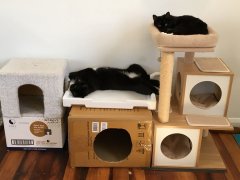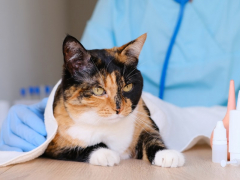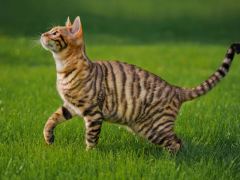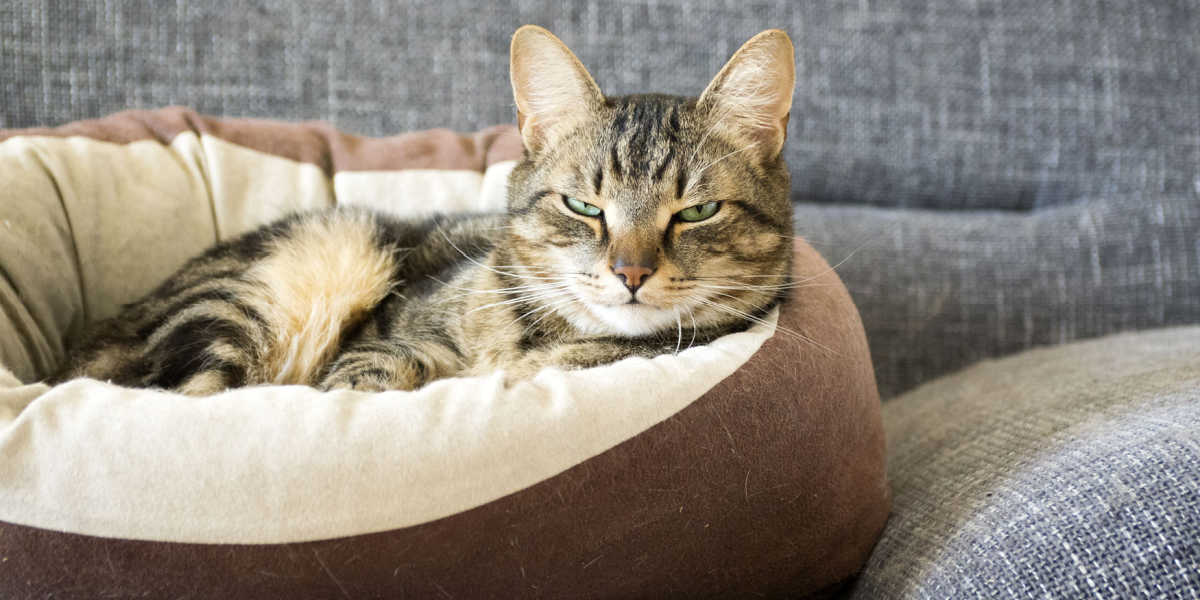
Typically, we associate masturbation and humping with canine behavior. But in fact, what many cat owners don’t know is that cats like to do it, too. You might catch your cat humping, or rubbing himself on something—which can often be your lap!
Cats display sexual behaviors, including masturbation, which are driven by the sex hormone testosterone. Neutered cats are less likely to display sexual behaviors as they no longer produce testosterone. Hypersexual behaviors might be caused by stress, pain, or underlying medical problems.Key Takeaways
It might sound unpleasant and many cat owners might be disgusted by it, but cats do indeed like to pleasure themselves. Sometimes it can be a normal and infrequent behavior, but sometimes it can be a cause for concern.
Why Do Cats Pleasure Themselves?
To put it simply, cats will pleasure themselves for the same reason as humans, and if they’ve got enjoyment out of it in the past, they’re likely to continue to do it. Sometimes, it can be a display of dominance, and sometimes young male cats might mount another cat, or hump a blanket simply because it’s fun and feels good.
Generally, masturbation is associated with entire male cats as it’s a hormone-driven behavior and is less of a problem in neutered male cats. Testosterone is the male sex hormone that drives most of their sexual behaviors, including spraying, humping, masturbating, and seeking out females.
When a cat is neutered, testosterone production will cease, leading to a reduction in any hormone-driven behaviors. But it can take up to six weeks for testosterone levels to drop off, so it can take time for these behaviors to disappear.
If cats continue to pleasure themselves after neutering, it might be because they were slightly older when they were neutered, meaning that the behavior has become a learned habit. Or it might mean that something else is going on—your cat might be stressed or unwell.
You might have found your cat having the occasional hump of its blanket or a pile of washing, or you might simply be curious about this topic. Although it’s often easy to spot if your cat is pleasuring himself, it can be quite a subtle behavior. Some of the signs that your cat is masturbating, or has the intention to include:
- Humping
- Rubbing their genitals on objects such as bedding or blankets
- Excessive licking of their genitals
- Overgrooming
- Excessive kneading
- Purring
- Drooling
When To Be Concerned
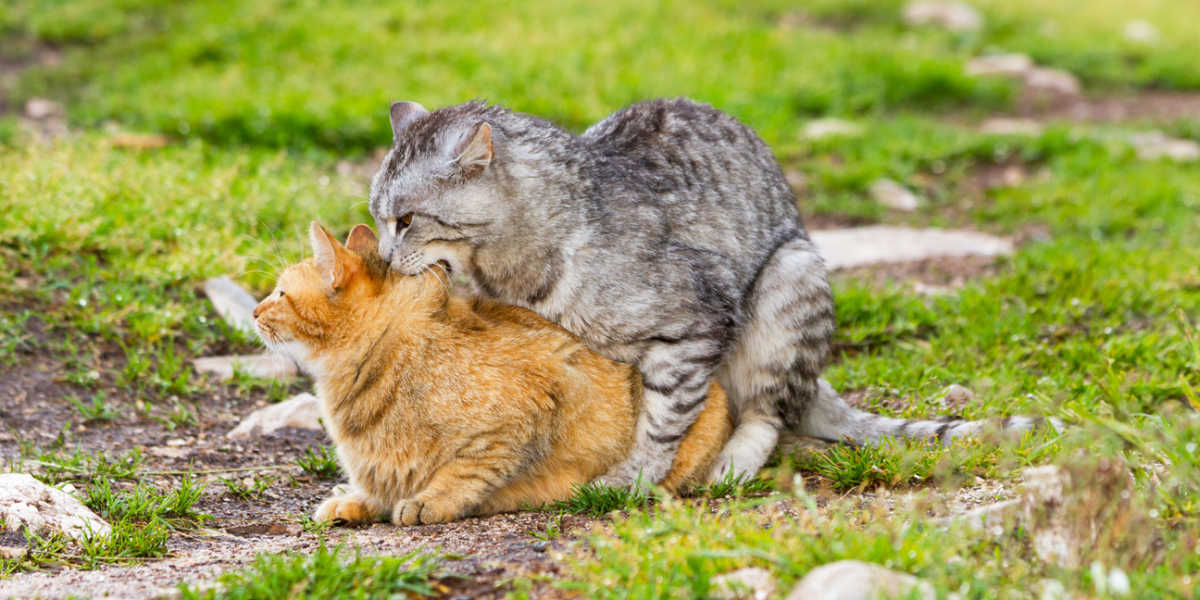
Cats might hump other cats in the household or inanimate objects.
The occasional humping or masturbation can be expected from an entire male cat, as testosterone often drives them to display these behaviors. And most cats will only do it every so often, and it shouldn’t cause them (or you) any problems. There’s certainly no harm in allowing your cat to enjoy a little self-indulgence once in a while.
But in some rare cases, sexual behaviors can become problematic and compulsive. Hypersexual behavior is when a cat displays excessive or obsessive sexual behaviors regularly.
Hypersexual behavior in cats is typically characterized by:
- Biting the nape
- Mounting
- Humping
- Penile erection
- Ejaculation
- Masturbation
Hypersexual behavior has several causes including:
- Inadequate neutering
- Cryptorchidism
- Adrenal hyperplasia or neoplasia
- FIP
- Primary behavioral disorders
- Temporal lobe epilepsy
- Neurological disorders
- Stress
- Social dominance
- Poor socialization
1. Stress
Cats are very sensitive to their environment, and they feel stress just like we do. Any change in their environment such as noisy guests, new pets, moving house, or something frightening them can cause them to feel stressed and unsettled.
When cats feel stressed, they tend to look for ways to relieve it, and it can lead to what we call compulsive behaviors. Some cats choose to indulge in pleasuring themselves and can do so multiple times a day, which is a cause for concern.
If you notice your cat compulsively masturbating, you’ll need to try to identify the cause of their stress. Perhaps you have got a new pet, or the neighbor’s cat is bothering them, or you’ve had guests staying. Perhaps your routine has changed, and you spend less time at home. Indoor cats are also more likely to suffer from stress-related behavioral problems.
So, once you have identified what may be stressing your cat, you can look at how to comfort them and make them feel more comfortable at home. This might be giving them their own space away from new pets or babies, providing them with more beds and toys, or a bit more attention from yourself.
You can also use calming pheromones such as Feliway around your home to make the environment more relaxing. It’s always important to speak to your vet too if you notice your cat behaving differently.
2. Health Problems
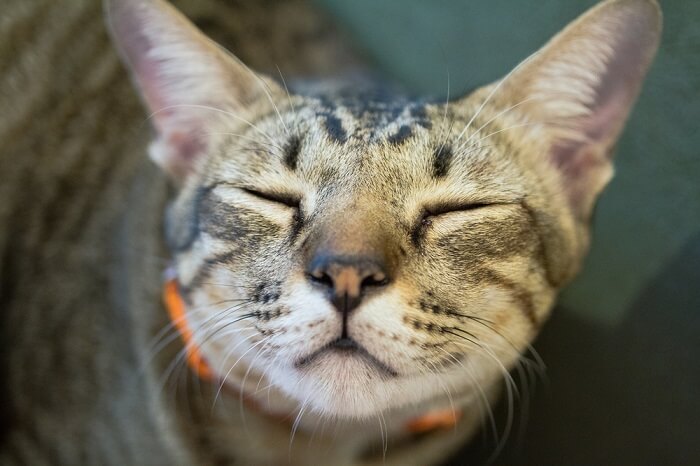
Certain health problems can causes changes in behavior, including hypersexual behavior.
Hypersexual behavior is often caused by underlying medical problems, in particular, it’s usually associated with disorders of the brain including brain damage, brain tumors, and epilepsy. There is only a small amount of research out there on hypersexuality in cats, so it’s something that scientists are still learning about all the time.
If you are concerned that your cat is displaying signs of hypersexual behavior, it’s important to speak to your veterinarian. They will want to examine your cat and run some tests to find out the cause.
Characterizing your cat’s behavior and assessing their environment and habits might help to rule out environmental causes such as stress or social dominance, and a qualified behaviorist will be able to assist here.
If your vet suspects a neurological problem, they might refer you to see a specialist neurologist for further assessment and imaging, such as MRI and CT scans to locate the problem within the brain.
Some studies are showing that the use of a medicine called phenobarbital can help to reduce hypersexual behaviors. One study found it to be effective long-term in preventing unwanted sexual behaviors.
What Should You Do if Your Cat Is Pleasuring Himself Too Much?
Most sexual behaviors in cats tend to be unwanted by their owners, and it’s one of the many reasons owners choose to get their cat neutered. If your cat is pleasuring himself every so often, there’s no harm to be had and it’s certainly ok to let him enjoy himself!
But if you’re starting to notice it happening too often or you become concerned about your cats’ sexual behaviors the first thing to do is speak to your usual vet and rule out any medical causes for the problem. Your vet may also recommend neutering if not already done, as removing testosterone can significantly reduce sexual behaviors.
A qualified feline behaviorist will be able to help you address any social or environmental issues that could be leading to your cats’ compulsive sexual behaviors. They may recommend changes to your cat’s environment or routine or suggest the use of pheromones or calming supplements to help your cat feel more relaxed.
Final Thoughts
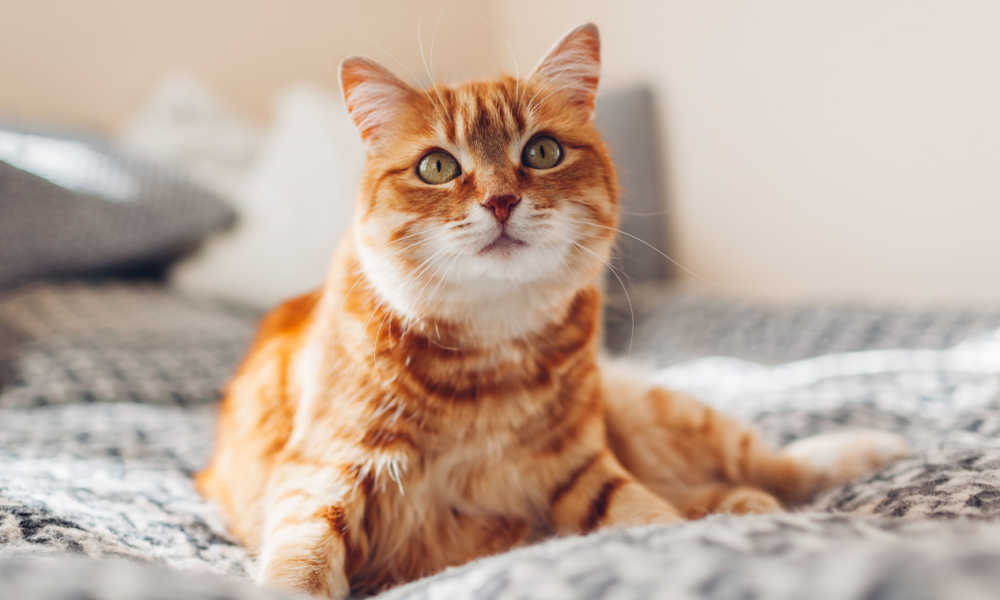
It can be normal for intact male cats to pleasure themselves every once in a while, but neutering them can often resolve this behavior.
Many cat owners don’t even know or notice that their cats pleasure themselves, but they certainly do it! It’s important to know that it’s not a harmful or bad behavior, and usually, it’s only seen in young cats and entire males.
However, in some very rare cases, cats can develop hypersexuality disorders where they display excessive or compulsive sexual behaviors such as mounting, humping, and masturbating. If you notice any changes in your cat’s behavior or you are concerned about hypersexuality, then it’s important to speak to your usual vet for advice.
Also Read: Cat In Heat (Estrous Cycles): Signs, Symptoms & Care
Frequently Asked Questions
Do cats masturbate?
Just like humans, and many other species, cats do masturbate. Although it’s not a common behavior and is usually only seen in intact males or cats with hypersexuality disorders.
Why do cats masturbate?
Testosterone drives sexual behaviors in cats, including self-pleasure. Generally, they do it because it’s fun and feels good. But it can also be related to social dominance, poor socialization, stress, and underlying medical problems.
Does neutering stop cats from humping?
Neutering stops the production of testosterone, so reduces sexual behaviors. However, it doesn’t always stop them completely as other environmental factors affect behavior including stress, health problems, social dominance, and habit.
-
https://www.sciencedirect.com/science/article/abs/pii/S1558787820301416

